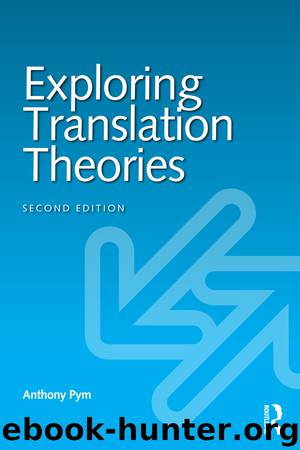Exploring Translation Theories by Pym Anthony

Author:Pym, Anthony [Pym, Anthony]
Language: eng
Format: epub
Publisher: Taylor and Francis
Published: 0101-01-01T00:00:00+00:00
6.2 The Uncertainty Principle
If you are told that “Friday the 13th” is equivalent to “martes 13” (Tuesday the 13th), you might accept the fact. Most professional translators would probably say the two are equivalent just because they are equivalent. The translators would perhaps then refer to some kind of authority, perhaps a dictionary, a bilingual friend, or probably themselves. Alternatively, you might remain skeptical, no matter what the authority. “Skepticism” means you are unsure about something. But there are several ways of having doubts. You might sit there and stare at the unknown word and get nervous about how little you really know, or you might ask more questions about the word. Even if you believe you will never be certain, you can still try to obtain knowledge. You could send translators mad by asking precisely what situations the equivalence holds in, or when the equivalence started to be produced, or why some formal difference persists, or how long the difference will remain (surely we should get the Spanish to adopt English superstitions about Friday, or vice versa?). Those questions will not help our translators at all. But they do lead to awareness of the authorities that the whole equivalence paradigm ultimately rests upon.
If we adopt this active kind of skepticism, we need not be asking annoying questions just for the fun of it. Even if we believe the questions can never be answered in any final way, or that we will ever reach any final truth, we might still consider it our duty to express doubt about all those authorities (teachers, dictionaries, experts, translators) that stop others from asking questions.
The kind of skepticism that most concerns the humanities derives from the observer effect: each observation is affected by the position of the observer. Something happens—let us say a car accident—and each observer’s account will be different. Each person was standing in a different position; they have different backgrounds and thus different interests in the accident. The element of uncertainty is simple enough in such cases, as is the epistemological skepticism of someone trying to investigate the accident. We can never trust any one observation absolutely. You might say that the thing observed—the car accident—never fully causes (explains, justifies, or accounts for) the person’s actual observation. Here we will say that the accident never fully determines the observations. Indeterminism is the general belief that events and observations are related in this way. Similarly, we could say that a text never fully determines (causes, explains, justifies, or accounts for) what a receiver understands of it. Each receiver brings a set of conceptual frames to the text, and the reception process is an interaction between the text and those frames. The same would hold for translation: no text fully determines a translation of that text, if only because translations rely on observations and interpretations.
The idea of indeterminism does not suit theories of equivalence. If we say that two texts are equivalent, we assume there is a stable understanding of both texts, at least to the extent that they can be judged to have the same function or value.
Download
This site does not store any files on its server. We only index and link to content provided by other sites. Please contact the content providers to delete copyright contents if any and email us, we'll remove relevant links or contents immediately.
Cecilia; Or, Memoirs of an Heiress — Volume 1 by Fanny Burney(32558)
Cecilia; Or, Memoirs of an Heiress — Volume 2 by Fanny Burney(31956)
Cecilia; Or, Memoirs of an Heiress — Volume 3 by Fanny Burney(31942)
The Lost Art of Listening by Michael P. Nichols(7506)
Asking the Right Questions: A Guide to Critical Thinking by M. Neil Browne & Stuart M. Keeley(5775)
We Need to Talk by Celeste Headlee(5615)
On Writing A Memoir of the Craft by Stephen King(4944)
Dialogue by Robert McKee(4404)
Pre-Suasion: A Revolutionary Way to Influence and Persuade by Robert Cialdini(4232)
I Have Something to Say: Mastering the Art of Public Speaking in an Age of Disconnection by John Bowe(3887)
Elements of Style 2017 by Richard De A'Morelli(3350)
The Book of Human Emotions by Tiffany Watt Smith(3309)
Fluent Forever: How to Learn Any Language Fast and Never Forget It by Gabriel Wyner(3083)
Name Book, The: Over 10,000 Names--Their Meanings, Origins, and Spiritual Significance by Astoria Dorothy(2987)
Why I Write by George Orwell(2954)
Good Humor, Bad Taste: A Sociology of the Joke by Kuipers Giselinde(2950)
The Art Of Deception by Kevin Mitnick(2804)
The Grammaring Guide to English Grammar with Exercises by Péter Simon(2744)
Ancient Worlds by Michael Scott(2688)
